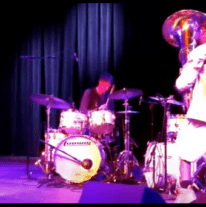As 2024 began with my exploring Who Sings It? collections from…
The ’70s…
… and the ’80s sequel ran during the summer…
It’s only fitting that the year finishes with a look at my sets from the ’90s. I devised these as CD collections of vinyl and cassette tracks converted to digital so I could upload them on my iPod.

A quaint notion now, I know. (Though I still have a working iPod.)
The conceit was that “Who Sings It?” was a question that could come up, should the track randomly pop up. It didn’t necessarily mean the song was by a one-hit wonder – just that I might not readily recall their name.
(Of course, I was in my late 30s when I created these collections. Now in my early 60s, it’s not as easy to readily recall any name.)
We start with a set from 1990. If it seems short, it’s because originally the set started with tracks from 1989, and I lopped those off to add to the final installment of the 1980s series.
One of the key themes of 1990 was nostalgia for the sounds of the late ’70s and early ’80s.
Some artists and songs simply nodded to those earlier sounds:

Jane Child on “Don’t Wanna Fall in Love…”

…and Nikki on “Notice Me” each found ways to evoke the sound of Prince.

Black Box’s “Love Unlimited” remix of “Everybody, Everybody” featured the swirling strings characteristic of Barry White’s orchestra.

More Than Words Can Say was a hit for Alias. The Canadian group formed around two members of the defunct Sheriff, whose “When I’m With You” became a No. 1 hit in the U.S. in 1989, six years after its initial release.
Two tracks in this collection made prominent use of classic cuts:

Mellow Man Ace’s “Mentirosa…”

… And Soho’s “Hippychick.
In the case of Mr. Ace, it was Santana’s “Evil Ways“and “No One to Depend On,” while Soho used the guitar track from The Smiths’ “How Soon Is Now?“
Four songs are straight-up remakes:

Grayson Hugh and Betty Wright teamed up for a remake of Champaign’s “How ’Bout Us” for the soundtrack of the movie True Love.

From Detroit, Inner City brought Stephanie Mills’ 1979 disco classic “Whatcha Gonna Do With My Lovin’” into the ‘90s with a house version.

Singer Sydney Youngblood just missed Billboard’s Top 40 with his remake of “I’d Rather Go Blind,” written and originally recorded by Etta James.

And Scottish group The Chimes remade U2’s “I Still Haven’t Found What I’m Looking For,” moving it further into a soul/house music mix.

Angelo Badalamenti might not be a household name, but film aficionados know his soundtrack work (Mulholland Drive, Blue Velvet.) His haunting theme for the TV series Twin Peaks was a 1990 standout.

Brent Bourgeois, formerly of the ‘Who Sings It’ act Bourgeois Tagg, earned a solo “Who Sings It?” track with “Dare to Fall in Love.”
That song hit the charts about three years after Bourgeois Tagg’s lone Top 40 hit, “I Don’t Mind at All.”
Dare to Fall in Love is one of four tracks unavailable on Spotify but is available here on YouTube, along with with:
- How ‘Bout Us
- Notice Me, and
- I’d Rather Go Blind being the others.
Here’s the Spotify playlist for the rest of this set:
Which ones do you like? Hate?
Share your thoughts in the comments.

Let the author know that you liked their article with a “Green Thumb” Upvote!





There some names here I haven’t heard in a long time, and some I don’t remember hearing at all. Alias? Sydney Youngblood? Brent Bourgeois? I have no memory of them at all. And so, yes, if these songs came on, I’d be asking, “Who sings it?”
Though you said Angelo Badalamenti might not be a household name, it’s the one I’m most familiar with. David Lynch movies wouldn’t be nearly as creepy or strange without Badalamenti’s work.
I don’t know all of these, but there are some really good cuts here. I like the Michael Penn track a lot. It was in the vein of the Beatles-tinged thing that was popping up a lot at that time, and it works. There are a bunch of tracks here that are in house territory- Stevie V, Inner City, Soho, Deee-lite, and Black Box, and I am down for them, 3 of which I learned about in Tom’s comment section at the time. For the years ’90 and ’91, I took a slew of the songs people posted in the comment section or that Tom talked about that were in dance mode, mostly house, and made playlists, which I still listen to from time to time. Early 90s house agrees with me much more than just about any era of dance music, excluding disco, of course.
That Alias song is quite dreadful, I say. A sub-par version of an already watered-down Chicago is not something anyone should have been asking for.
Oof…I just don’t know the 90s that well. I’m always impressed with how well folks even older than me remember these songs.
BUT! I definitely remember “No Myth” by Michael Penn. What a wonderful song that is. I had long forgotten it until one day I heard it in my bank lobby. Love it.
Dance music making a big impact as the 90s begins. Whereas the 80s was full of acts that meant nothing to me, there’s a lot of familiar names here.
Inner City, Black Box, Soho, Sydney Younglood, The Chimes and Adventures of Stevie V all had big top 10 hits here. Inner City and Black Box with multiple entries.
Soho’s were a one hit wonder but what a hit. A fate that The Chimes, Sydney and Stevie V narrowly escaped even if no one remembers their lower charting follow ups.
For Sydney Youngblood neither of his UK top 40s were I’d Rather Go Blind. It was If Only I Could that was his #3 chart smash. Saw him perform it (mime along anyway) at the Radio 1 Roadshow in Newcastle. His brief success was already in the rear view mirror and the audience was sparse.
Glad to see this series back, even though I knew practically none of them.
Thanks, ltc. Maybe you’ll know more in future installments!
“This is the girl.”
Mr. Luigi does not think very highly of the espresso.
Angelo Badalamenti in Mulholland Drive.
I’ve seen this trope before: The European national who looks down on the coffee served in America. Badalamenti spitting out the contents of the espresso on a white napkin, the first time you see it, isn’t exactly ha ha funny because his character, the mafia guy as executive producer, is a scary dude.
Mr. Luigi doesn’t kill anybody, so when you see it again, you relax, realizing it’s just David Lynch’s sense of humor.